Login
Registration enables users to use special features of this website, such as past
order histories, retained contact details for faster checkout, review submissions, and special promotions.
order histories, retained contact details for faster checkout, review submissions, and special promotions.
Forgot password?
Registration enables users to use special features of this website, such as past
order histories, retained contact details for faster checkout, review submissions, and special promotions.
order histories, retained contact details for faster checkout, review submissions, and special promotions.
Quick Order
Products
Antibodies
ELISA and Assay Kits
Research Areas
Infectious Disease
Resources
Purchasing
Reference Material
Contact Us
Location
Corporate Headquarters
Vector Laboratories, Inc.
6737 Mowry Ave
Newark, CA 94560
United States
Telephone Numbers
Customer Service: (800) 227-6666 / (650) 697-3600
Contact Us
Additional Contact Details
Login
Registration enables users to use special features of this website, such as past
order histories, retained contact details for faster checkout, review submissions, and special promotions.
order histories, retained contact details for faster checkout, review submissions, and special promotions.
Forgot password?
Registration enables users to use special features of this website, such as past
order histories, retained contact details for faster checkout, review submissions, and special promotions.
order histories, retained contact details for faster checkout, review submissions, and special promotions.
Quick Order
PathPlusTM KLK3 / PSA Antibodies
Prostate specific antigen (PSA), or Kallikrein-Related Peptidase 3 (KLK3), is a secreted protease produced in prostate glandular epithelium that is thought to function in the liquefaction of seminal fluid. PSA is a highly sensitive and specific diagnostic marker for recurrent prostate carcinoma after prostatectomy. It is also useful for confirming suspected prostatic origin in the setting of metastatic carcinoma. PSA is expected to have cytoplasmic staining in normal prostate tissue, periurethral and perianal glands, the bladder, the urethra and in seminal vesicles. PSA can also be found in tumors of the colon, liver, lung, parotid, adrenal, and ovary, and in metaplasias of the bladder and nodular hyperplasia or prostatitis.
References: Oesterling, 1991; 1988; Stamey, 1987.
7 PathPlusTM Antibodies
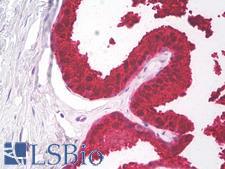
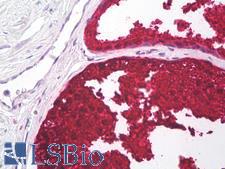
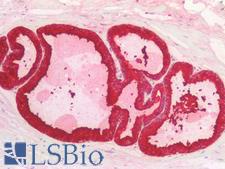
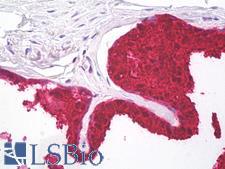
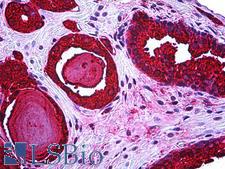
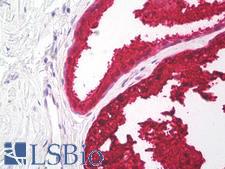
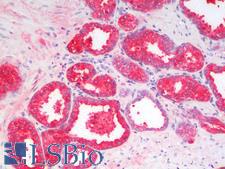
☰ Filters
Products
Antibodies
(7)
Type
Primary
(7)
Target
KLK3 / PSA
(7)
Reactivity
Human
(7)
Mouse
(1)
Application
IHC
(5)
IHC-Fr
(4)
IHC-P
(7)
WB
(4)
Flo
(4)
ELISA
(2)
ELISPOT
(3)
ICC
(4)
IRMA
(1)
Host
rabbit
(2)
mouse
(1)
mouse-balb/c
(4)
Product Group
PathPlus Cancer
(7)
PathPlus Cancer Pathology
(7)
Isotype
IgG
(1)
IgG1
(5)
Clonality
monoclonal mc
(5)
polyclonal pc
(1)
recombinant monoclonal rmc
(1)
Clone
1A7
(1)
2B7
(1)
3E6
(1)
C3F12
(1)
KLK3/2871R
(1)
Format
Unconjugated
(7)
Epitope
Internal
(1)
Publications
No
(7)

Cancer Pathology
Cancer
KLK3 / PSA Mouse-Balb/c anti-Human Monoclonal (C3F12) Antibody
Human
ELISPOT, Flo, ICC, IHC, IHC-Fr, IHC-P, WB
Unconjugated
0.1 mg/$375

Cancer Pathology
Cancer
KLK3 / PSA Mouse-Balb/c anti-Human Monoclonal (1A7) Antibody
Human
ELISPOT, Flo, ICC, IHC, IHC-Fr, IHC-P
Unconjugated
100 µg/$375

Cancer Pathology
Cancer
KLK3 / PSA Rabbit anti-Human Polyclonal (Internal) Antibody
Mouse, Human
IHC-P, WB
Unconjugated
50 µl/$375

Cancer Pathology
Cancer
KLK3 / PSA Mouse-Balb/c anti-Human Monoclonal (3E6) Antibody
Human
ELISPOT, Flo, ICC, IHC, IHC-Fr, IHC-P, WB
Unconjugated
0.1 mg/$375

Cancer Pathology
Cancer
KLK3 / PSA Mouse anti-Human Monoclonal Antibody
Human
ELISA, IHC, IHC-P, IRMA
Unconjugated
0.1 mg/$375

Cancer Pathology
Cancer
KLK3 / PSA Mouse-Balb/c anti-Human Monoclonal (2B7) Antibody
Human
ELISA, Flo, ICC, IHC, IHC-Fr, IHC-P, WB
Unconjugated
0.1 mg/$375

Cancer Pathology
Cancer
KLK3 / PSA Rabbit anti-Human Recombinant Monoclonal (KLK3/2871R) Antibody
Human
IHC-P
Unconjugated
100 µg/$525
Viewing 1-7
of 7
product results











